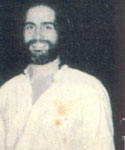
 |
"Music came before the word and I've found over the years that music has become an expression of individuals, of groups, of tribes, etc. Each one has its own sonic personality to it." |
|
Everyday in Manhattan's art gallery district, Soho, people wander by the open doors at 99 Prince Street. Often they stop and gaze in at what looks like a children's wonderland. Hundreds of brightly coloured helium balloons cover every inch of the cavernous ceiling. They wonder if it is another art gallery and are often drawn up the steps to find that it is in fact a private residence, the home of David Mancuso.
For 13 years, every Saturday night, originally nearby on Broadway and for the last eight years at his present home, David Mancuso has been throwing rent parties for about 500 guests. Entrance is by invitation only. Liquor is not served. Juice and food are given away and the raison d'Ítre for everyone coming here is to dance to what is reputed to be one of the world's finest sound systems. David is the parent and progenitor of much of NYC's dance scene. In 1975 he, along with Steve D'Aquisto and Vince Aletti, wrote the charter for the first DJ record pool. He has also consistently popularised new music; bringing the Barrabas LP back from Spain and selling it at cost in The Loft as well as playing a major role in getting Eddy Grant's music over to the hard core dance audience. He long abandoned the use of either a mixer or headphones. There is no overlaying or re-mixing of records at The Loft. They simply follow after each other as rhythmically as possible and Mancuso's editorial input is restricted to the narrative of the song's sequencing and the fidelity with which they are reproduced by the custom-made Paul Klipsch speaker system, Mark Levinson amplifiers, Mitchell Cotter turntable bases and line amplifier and the Koestu hand-crafted cartridges. As I interviewed him, David and company barbecued out on Prince Street. Guests come and go and the ambience reminds me of the best parts of the 60s. During the interview he apologised for his tentative verbal style. In some ways David, who was an orphan, has created the ideal surrogate family with the friends who help him maintain the energy of The Loft and the guests who come to dance. He discovered many a worker's dream when he told me that his weekend really starts on Wednesday evening and ends the following Wednesday. SH: How would you define the spirit of the house party? DM: "It's very simplified. We don't sell food. We don't sell cards (memberships). Therefore, we are able to keep it in the spirit of invitation. It was my own way of socially rebelling." You have very specific ideas on sound. Could you talk about them? "Music came before the word and I've found over the years that music has become an expression of individuals, of groups, of tribes, etc. Each one has its own sonic personality to it. The excitement and sensationalism of the musical event and the time and space in which it's happening should be left up to the musicians entirely. Adding and subtracting things electronically will take away from that. Therefore it doesn't come through clear. That's what we're striving for here. No new ideas - it's all physics and fundamentals. The whole idea is what's in the groove is transcribed as close as possible to what the musician intended. No attenuating highs, no adding boom boxes -try and do it as naturally and simply as possible. "The people who build these electronics and the speakers are into that. They're all craftsmen. The person who made the cartridge did it by hand (holds up cartridge showing a hand-painted Japanese signature). He used to make swords. If the ambience is in the groove it'll come out. When you can listen to a recording and tell what make the instruments are, you're getting close." |